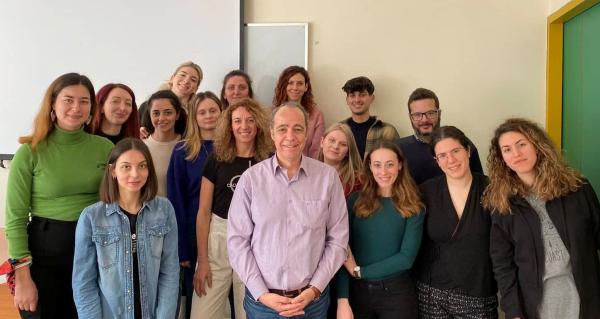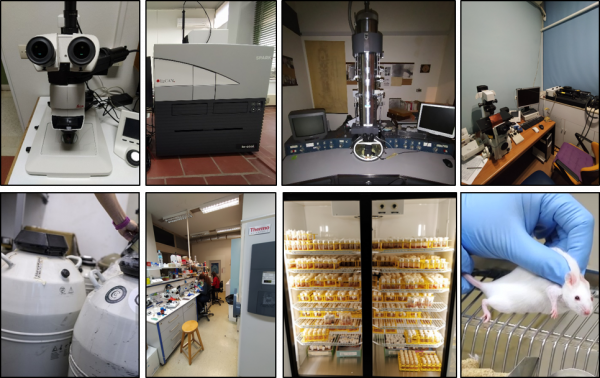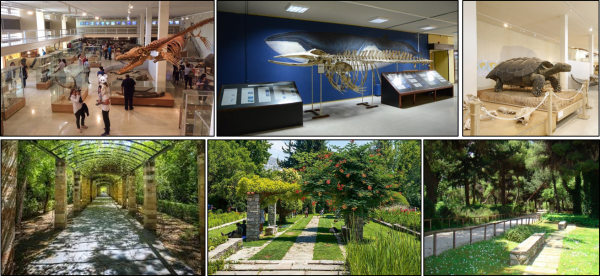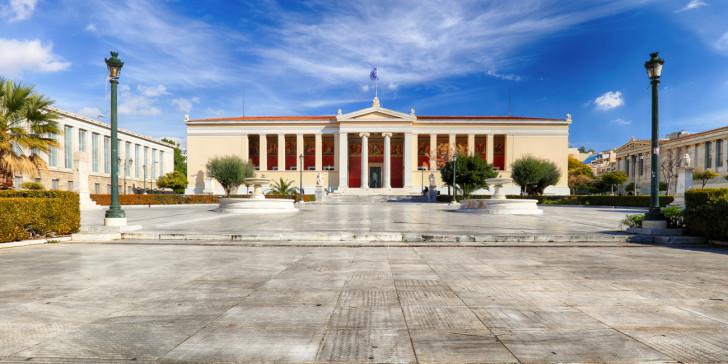Our research aim is to gain valuable insights into the fundamental cell-autonomous or systemic biology of aging and of age-related diseases by exploiting a multidisciplinary approach.
Particularly, we employ a multidisciplinary systems biology (cell-based, in vivo models) approach in order to understand: a. the different levels of regulation and cross-talk of the various proteostatic machineries; b. the interaction, wiring and functional integration of proteostatic modules with mitostasis, metabolic pathways and genomic integrity; c. the systemic effects induced at the whole organism level by tissue-specific loss of proteostasis; and, d. the deregulation of proteostatic and mitostatic modules in ageing and/or age-related diseases (e.g. cancer). Our lab is also involved in high-throughput screening for the identification of small molecules with anti-ageing and/or anti-cancer activity, as well in the study of the cellular-molecular effects induced by therapeutic anti-tumor proteasome inhibitors.
Particularly, we employ a multidisciplinary systems biology (cell-based, in vivo models) approach in order to understand: a. the different levels of regulation and cross-talk of the various proteostatic machineries; b. the interaction, wiring and functional integration of proteostatic modules with mitostasis, metabolic pathways and genomic integrity; c. the systemic effects induced at the whole organism level by tissue-specific loss of proteostasis; and, d. the deregulation of proteostatic and mitostatic modules in ageing and/or age-related diseases (e.g. cancer). Our lab is also involved in high-throughput screening for the identification of small molecules with anti-ageing and/or anti-cancer activity, as well in the study of the cellular-molecular effects induced by therapeutic anti-tumor proteasome inhibitors.
Currently, our lab employs 4 postdoctoral researchers, 3 Ph.D. students, 3 MSc students, and 6 BSc students. We are fond of highly motivated students and technically skilled exceptional scientists with a “can-do” attitude, who share our passion for science. We embrace creativity and a strong teamwork spirit in an innovative work environment.

“Talent wins games, but teamwork and intelligence wins championships”

“Talent wins games, but teamwork and intelligence wins championships”
Michael Jordan (professional basketball player)
Our laboratory is located in the Panepistimiopolis Campus of the Zografou area, on the eastern outskirts of the sunny and historical city of Athens. As part of the fully renovated Department of Cell Biology and Biophysics (DCBB), we are equipped with state-of-art research facilities including settings for imaging, molecular biology, cellular biology, and biochemistry. Moreover, our department provides infrastructures for insect and animal cells culturing including the completely newly established cell culture and transgenic flies units, along with a small animal house. Taking advantage of these facilities the "Ageing and Age-Related Diseases" group maintains a collection of numerous normal and cancer human cell lines, as well as of transgenic fly lines and two transgenic mouse lines. Recent additions to the bioimaging unit are the upgrade of our confocal laser scanning microscope, the purchase of state-of-the-art equipment for cryo-electron microscopy sectioning, the acquisition of new inverted fluorescent scopes, and a high-resolution fluorescence stereoscope with high depth of field and maximum resolution for precisely detailed 3-D information. Last but not least, our lab owns a high throughput TECAN microplate reader and a hyper-centrifuge.


The "Ageing and Age-Related Diseases" group (early 2010 - 2022) has received funding (including on-going contracts) from the Industry (US, EU and Greek Pharmaceutical or Cosmeceutical companies), as well as from Hellenic foundations, HFRI, the Hellenic State Scholarships Foundation, Hellenic GSRT and European Union (COST actions, FP7, H2020). Furthermore, a significant expertise with several “success stories” has already accumulated in screening natural compounds and/or drugs for their physiological and/or anti-ageing, anti-cancer effects.
DCBB, as already mentioned, is part of the Faculty of Biology, one of the newest faculties in the School of Science. The Faculty of Biology was founded in 1970, along with the current Faculty of Geology and Geoenvironment, following the division of the Department of Natural Sciences, formerly established in 1932. In the 90’s the Faculty of Biology substantially reformed its academic curriculum to standards fully equivalent to those of high-caliber institutions abroad. The Faculty of Biology is well known for its practical-oriented educational curriculums, science courses for hands-on experience in the laboratory, field trips, and active participation in several social events to communicate science and research to the society, such as the yearly Science Festivals. Additionally, since 2003, the Faculty of Biology has been offering several postgraduate programs in e.g., Applications of Biology in Medicine, Bioinformatics, Clinical Biochemistry and Molecular Diagnostics, Microbial Biotechnology, etc.
Parts of the Faculty of Biology are the Zoological Museum, the Botanical Museum, and the Botanical Garden of the University of Athens, which house and protect several collections of species from Greece or abroad. Furthermore, the Faculty of Biology is involved in the administration and operation of ‘Julia & Alexander Diomedes Botanical Garden’.

The Faculty of Biology ranks first in the country, while it is a major player among top-ranking higher educational institutes worldwide.
All the infrastructures described above are administrated by the National & Kapodistrian University of Athens (NKUA), the oldest and largest institution of higher education in Greece, Balkans and eastern Europe. Its size and diversity of scientific, technological, social, and humanitarian activities nominate NKUA among the most influential organizations in Greece. To support its members NKUA hosts a large number of managerial and administrative bodies, several Secretariats, and the Special Account for Research Grants. It offers high-level education through its Schools of Theology, Law, Economics & Political Sciences, Health Sciences, Philosophy, Sciences, and Independent Faculties as well via other inter-departmental programs. Each School is composed of several Faculties and/or Departments that are specialized in almost all thematic areas of modern research. Also, there are several NKUA affiliated clinics in most public hospitals in Athens; these clinics cure patients in all fields of medicine. NKUA has signed 153 bilateral agreements of cooperation with universities from all over the world and participates in several thematic networks. NKUA is a major excellence institute of Balkans and of the Eastern European Area and an active member of (among others) the Community of the Mediterranean Universities, the SOCRATES and the CIVIS education EU programs.

